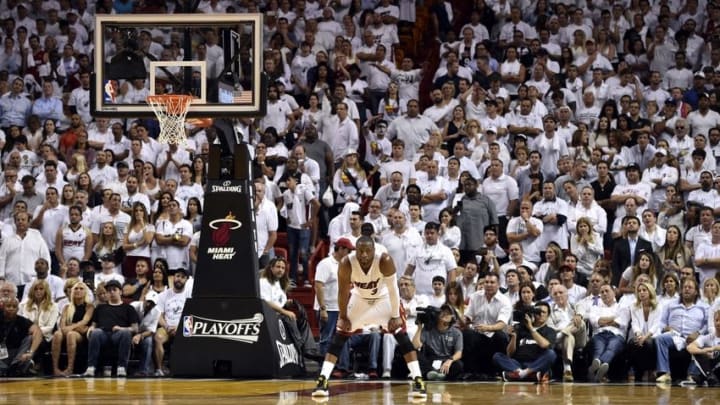Life After LeBron
After a less-than stellar performance in the Finals, Wade took it upon himself to try a version of the paleo diet, losing a considerable amount of weight over the summer, hoping to ease the load on his knees as he was now going on 33 years old. In his first season without James, Wade would average 21.5 points and 4.8 assists per game, and also had a couple 40 point games over the course of 62 played.
However, with all his individual feats, the Heat failed to achieve the same level of success as the previous four years brought, and it’s not easy to make a postseason run with one of your two best players goes down with a season ending blood clot issue. Even with a revamped roster, the Heat only amassed a 37-45 record, eight games below .500 and just out of reach for the eight spot in the east playoff race. Overall, the most disappointing season in years, other than the discovery of Hassan Whiteside and the acquisition of Goran Dragic.
Going into the next season, expectations were drastically different. With Luol Deng and Wade returning to the Heat and Chris Bosh recovered from blood clots, Miami had a formidable starting five of Dragic, Wade, Deng, Bosh and Whiteside, bringing in 10th overall pick Justise Winslow, second round steal Josh Richardson and veterans Amar’e Stoudemire and Gerald Green, it looked as if Cleveland finally had a team to worry about in the east.
With Wade on a new minute restriction as well as a new training schedule, he looked the healthiest he’d been in years, playing in the most games he played in since 2011 with 74. Once again named an All Star starter, Wade put up smooth averages of 19.0 points, 4.6 assists and 4.1 rebounds per game, all while playing a career-low in minutes-per-game(30.5.)
At a point it seemed everything was at an all-time high, the Heat were struck with news you had to hear to believe. Chris Bosh’s blood clots had returned, and he was forced to go back on blood-thinners, limiting his physical ability for that time period.
What did Pat Riley go out and do? Just weeks after the All Star break, the Heat signed a recently waived Joe Johnson, who would go on to have a big impact with Miami over 24 regular season games, averaging 13.4 points while shooting 50 percent from the field and 41 percent from downtown.
The Heat entered the playoffs as the third seed and faced the Charlotte Hornets in the first round. After roaring out of the gates and taking a 2-0 lead, the Heat would lose three straight, including Game 5 at home as the Hornets would push them to the brink. Going back to Charlotte for Game 6, it was once again Dwyane Wade time. Scoring a cool 23 points on the road, Wade would heroically lift the Heat to a thrilling Game 6 victory, scoring eight points in the waning minutes, hitting back-to-back threes in the process.
A blowout Game 7 win followed, and the Heat were on to the second round, where they would face the Toronto Raptors.
Although he averaged 27.3 points per game in the series, including a vintage 38-point performance in Game 3, the Heat, without Chris Bosh and Hassan Whiteside, were unable to overcome the Raptors, losing the series in seven games.
Next: Aftermath and Departure
